- Home
- Jason Webster
Or the Bull Kills You
Or the Bull Kills You Read online
Para Montse,
que sin tí este libro no existiría.
Bien sabe el sabio que no sabe; sólo el necio piensa que sabe
The wisest of wise men knows that he knows not; only a fool thinks he knows
Spanish proverb
He watches the blood as it trickles from a wound near the back of the neck, seeps over a shoulder, thickens into a steady stream, before turning into a torrent, coursing over hair and skin, pushing its way down in thick pulses until heavy drops begin to fall on to the sand below. Unable to move from his seat, as though tied to his chair – the chair of honour, they’d called it – he struggles to breathe. Below, the killer holds his blade high and rises up on to the balls of his feet as he prepares for the final thrust, piercing his victim’s back, slicing through ribs, splitting lungs.
He feels an urge to call out, but his captors are watching him: it is his duty to see this. Only he can pass judgement. Forced to be the overseer, their master of ceremonies, he stares, while trying not to see. The killer is ready, calm, the weight of a thousand previous kills evident in his poise. They say he is good, this one. Turns murder into an art.
The victim waits, bloodied, exhausted, tongue hanging heavy and dry, refusing to give in.
There is barely a sound. He hears the killer suck in air through clenched teeth…
And he is here again: smaller this time, lighter. How old had he been? Nine? Perhaps ten. There had been a shadow behind him – an elderly man, trying to ease his distress, patting him tenderly on the shoulder. There was nothing to fear, nothing. His grandfather meant well: a distraction, a change, something to help him forget. But this had made it worse. And so he’d run out, and his grandfather had followed, drying his tears outside in the shadows with his shirt sleeve. He’d always been grateful to him for that, coming with him rather than waiting inside to see the kill. They went home together, walking hand in hand in silence. He’d sworn he’d never watch this again.
But now he has broken his vow. Not only witness, but adjudicator.
The killer stretches up to his full height, gives a cry, and the victim lurches towards him with a final burst of life. The killer catches him on the rise, forcing his sword down to the hilt past bone and through flesh, before dancing to safety at the side. Next to him, the victim gives a deep, echoing groan.
The spectators are on their feet, cheering and waving. The drama and spectacle have reached their climax. The victim staggers for a second, then falls to the ground, legs now helpless pegs thrusting out from a steaming body. With a final breath the head slumps to the sandy floor.
The killer turns to the applauding crowd, raising his hands before crossing them over his breast as he acknowledges their adoration.
The president turns to his two advisers. They both nod, and with heavy, sick indifference he pulls out his white handkerchief and places it over the balcony in front of him. The bullfighter pretends not to notice, but the crowd erupts with joy.
Contents
Part One Tercio de Varas
Chapter One
Chapter Two
Chapter Three
Chapter Four
Chapter Five
Chapter Six
Chapter Seven
Part Two Tercio de Banderillas
Chapter Eight
Chapter Nine
Chapter Ten
Chapter Eleven
Chapter Twelve
Chapter Thirteen
Chapter Fourteen
Chapter Fifteen
Chapter Sixteen
Chapter Seventeen
Chapter Eighteen
Chapter Nineteen
Chapter Twenty
Part Three Tercio de Muerte
Chapter Twenty-One
Chapter Twenty-Two
Chapter Twenty-Three
Chapter Twenty-Four
Epilogue
Acknowledgements
Glossary
Part One
Tercio de Varas
One
Either you kill the bull, or the bull kills you
Traditional
Saturday 11th March
Chief Inspector Max Cámara of the Valencia Cuerpo Nacional de Policía cast a dark eye over the other guests at the Bar Los Toros, and sniffed.
Stopping by the Jefatura after lunch had been a mistake.
‘Cámara, there’s no one else around. You’ll have to stand in for me.’
The idea had been to run in quickly to see if he was owed any leave. Fallas was coming, Valencia’s pyromaniac spring fiesta, and he was hoping to get out of the city until it was over. But he could still hear Pardo’s voice as the commissioner raced through the door, his wife waiting for him outside in a taxi with their three-year-old. There had been no time to remind Pardo he knew nothing about bullfighting, or that he hated it: a daughter with suspected meningitis took precedence over everything. Still, someone else could have stepped in. Maldonado, perhaps. He would have revelled in the pomp and glory.
As it was, though, he had ended up standing in as president of that afternoon’s corrida, wondering to himself if there was anyone in the country less suited to the job. Pardo loved it – one of the perks of being a top policeman in a big city. Cámara had sometimes imagined him sitting up there in the balcony, the grave, unsmiling face, all the responsibility of the spectacle on his shoulders as representative of the Ministry of the Interior – the branch of government that oversaw bullfighting. He was convinced Pardo enjoyed it even more than the few times he managed to appear on TV at the successful conclusion to a case. Anyone foolish enough to go near him the day after a fight would be regaled with unnecessary detail on whether one or two ears – if any – he had ordered be cut off each dead animal and given to the matadors in recognition of their performances. Sometimes they even cut off the tail as well and presented it to the torero as a trophy, but Pardo didn’t go in for that: it was rare. And a bit showy.
It could have been a disaster, but two others had sat with him in the presidential box – one an expert on bullfighting, the other, Cámara discovered to his surprise, a vet – to guide the president in his decisions. Cámara allowed himself to be steered by these stern-looking men. They made it clear they were unhappy that Pardo hadn’t made it himself, sending a subordinate with no knowledge – or even apparent interest – in los toros.
‘When did you say Pardo found out about his daughter?’ one of them – the vet – had asked. His heavy, inanimate face stared out at the crowd, as if Cámara were to blame for the little girl’s illness. And the two of them sucked on their cigars, veiled behind clouds of blue smoke: still, lifeless shadows on the outer reaches of his line of vision. Thank God they hadn’t been invited to the Bar Los Toros.
Actually, Cámara wasn’t quite sure why he had been invited himself to this award ceremony for Jorge Blanco, the star of the afternoon. All three matadors had come close to blending into one for him – each one finishing by slaughtering the bull. Only the reaction of the crowd had alerted him to possible differences. The first had been given a mixed welcome. What was his name? Cámara dug his hands into his pockets looking for the glossy programme that had been thrust at him when he arrived at the bullring. He stared into the face of a man in his mid-thirties, dark sideburns stretching down his cheeks: Alejandro Cano. The crowd had whistled at him at the end of his first fight, while his second had gone better: applause, and perhaps a trophy ear; he wasn’t sure now.
The second matador had been cheered almost from the start. That one he did remember more clearly: the one they were waiting for now in the Bar Los Toros. Jorge Blanco, the man who had single-handedly saved Spain’s national fiesta from oblivion. Or at least there had been comments to that effect. His fac
e had even appeared recently on the front page of El País; he was becoming a hard man to avoid. The crowd loved him, applauding every move with the cape, every triumphal swipe with his sword. He had rescued the old values of bullfighting, they said. Valour, strength, and a true life-and-death struggle with the animal. Down there, on the sand, Blanco put his balls on the line like no other bullfighter.
Cámara had pulled out his handkerchief twice for him the first time – meaning two trophy ears – then again with his second bull, the fifth of the six that made up the afternoon. His advisors had twitched at that point: perhaps he’d overdone it, but looking at the jubilant spectators – almost 13,000 people; the place was full to capacity – he’d decided to err on the side of generosity, the policeman in him considering the crowd-control options should any reluctance to award severed ears on his part lead to a riot.
At the end of the afternoon, Blanco was festooned as admirers threw flowers and cuddly toys to him. A live hen caught Cámara’s eye as it was hurled down into the ring, Blanco’s assistants handing it to the matador to lay his hands on before they threw it back to the crowd and, hopefully, to reunion with its owner. That night, he imagined, someone in Valencia was about to feast on chicken that had been blessed by the great man himself before having its throat slit.
Cámara remembered Blanco’s keen steady eye, his slightly upturned nose, heavy eyebrows and pained, almost tortured air. There was no standing on ceremony about him, no dedicating the fight to one of the bullfighting grandees down in Sombra – the expensive seats. Each fight had gone to the crowd itself, and they loved him even more for it.
Cámara glanced down at the last photo on the flyer. It was the young Antonio de Mora’s first proper bullfight, they’d said. At some stage before his first bull there had been a mini-ceremony of sorts down in the ring where Cano had acted as his godfather – a rite of passage from novillero, or apprentice, into fully fledged bull killer. The crowd was generous, applauding after each despatched animal, but there were no ears today for de Mora. Blanco was the man, and once the whole thing had finished some of the crowd rushed into the ring and carried him off on their shoulders through the main door – la Puerta Grande – and out into the street. That was the greatest honour for a bullfighter, his companions had told him before taking their leave, a last impassive handshake before joining their aficionado friends.
Cámara stood on his own for a moment in the presidential box, wondering how quickly he could get out of there before anyone noticed him, when the owner of the Bar Los Toros introduced himself and asked him to join them. He was president of a peña taurina – a bullfighting appreciation society – he said, and they were giving Blanco an award for the previous year’s performance, as doubtless they would be doing next year for what had just taken place that afternoon. It would be an honour for them if today’s president himself could be present. Cámara had been on the point of turning him down; he’d already made other arrangements.
‘I’d be delighted.’
The words had come out with curious ease.
Now, as he sat in the grubby surroundings of the Bar Los Toros down a street at the back of the bullring, with a quickly vanishing glass of Mahou lager in his hand, he began to wonder. The owner was talking to the barman, leaning in to make himself heard above the noise of the TV set bolted high in a corner and a dozen conversations bouncing off the red-painted greasy walls. Blanco still hadn’t shown up, while conversation with the two dozen other people there was proving difficult: something about the chief inspector, perhaps his clothes, just the way he was, told them he wasn’t an aficionado, not one of them.
If any of them had focused on him at all, they would probably have described Cámara as an unassuming man, with short, dark, slightly ruffled hair crowning a high forehead, a larger than average chin, dark brown eyes and a crooked, fleshy nose – the kind of person who no doubt could look after himself, and had possibly had to do so on more than one occasion. More perceptive observers of the forty-two-year-old might notice other details: strong yet thoughtful hands devoid of any rings, bracelets or watch; an observant expression in his lively brown eyes; and a vulnerability only partially masked by his broad shoulders and powerful physical presence. He was a man you would pass without a second glance down a street in broad daylight, but who might cause you some unease were the same situation repeated at night.
As he sat at the bar at the edge of the group, wondering whether to make a last attempt to talk to some of the other guests, a proverb – one of the dozens his grandfather used to repeat – floated through his mind: Más vale estar solo que mal acompañado – Better to be alone than in bad company. He shouldn’t have come.
The last mouthful of beer disappeared from his glass and he looked around the room. The other guests looked to be pijos to a man – rich, well-dressed conservatives: people he might have to mix with at work on occasion, but rarely chose to spend his free time with. The other side of Spain, the other tribe. He leaned back in his chair. Five more minutes and then he’d go.
To kill time, he decided to play a game to see if he could work out who some of them were.
An elderly man sat at a table dressed in heavy tweeds, his hair slicked back and with a well-heeled country air about him. Cámara felt certain he was a bull breeder. He checked his flyer again. The bulls for the fight had come from the Ramírez farm, their symbol a large capital letter ‘R’ with a cross running through the lower right tail. Cámara had noticed it burnt onto the haunches of some of the bulls earlier on. Was this the man who had bred them? For a moment Cámara observed his thin, downturned mouth, large hooked nose, small untrusting eyes. His hair was almost white, and gave him a distinguished air, albeit in a slightly studied way.
Cámara moved on, scanning the room.
One face seemed familiar now – a woman standing at the centre wearing a red low-cut dress and exceptionally high, strapped silver heels. Cámara was sure he had seen her on TV, with her bee-stung lips and tightly stretched bronzed complexion. She looked like the kind of person who appeared on the gossip programmes, screaming out the intimate details of their love lives in a constant search for higher and higher doses of media attention. Carmen Luna? Wasn’t that her name? If Almudena had been there with him she would have told him her life story by now. Cámara searched his memory for some reference to her. If she was here she must have something to do with Blanco. Weren’t they engaged? Rumoured to be getting married soon? Blanco couldn’t be more than thirty-five years old. There was no way Carmen was less than fifty. On a good day.
He watched for a moment as her eyes darted about the room clocking all the men who were looking at her.
Another woman – the only other one there – was standing on the far side of the bar. She was slightly stockier than Carmen Luna, and wore a pair of tightly fitting jeans. Her hair was cropped short and highlighted, while a pair of large brown sunglasses perched on top of her head like an Alice band. She smiled broadly as she talked to a couple of men leaning in towards her, both captured by her energy, an attractive force more powerful than mere good looks. In fact, she wasn’t pretty in any conventional sense, or at least not in Cámara’s mind. Her nose was a little too long and sharp, her figure a little plump, while the slight gap between her two front teeth meant she was never going to star in any toothpaste commercials. And yet it was clear from her poise that she was used to being in the company of men, and enjoyed it.
Cámara watched her for a while trying to work out who she was, but nothing, no clue, came to mind. Yet something about her was familiar. For a moment she noticed him looking her way and smiled, before turning back to her companions. Cámara stood up and headed to the bar to get himself a last quick drink. Time was beginning to drag. And still no sign of Blanco.
The door opened and all heads turned expectantly. A tall man in a dark suit appeared, and Cámara was immediately struck by his resemblance to the elderly bull breeder he’d identified earlier. A few voices called out in greeting –
‘Hola Paco!’ – but he could sense the collective groan around the bar: it wasn’t Blanco. After shaking a few outstretched hands, the newcomer went and sat beside the bull breeder, where the physical similarity between them was even clearer: the same hooked noses, the same small eyes. Even his hair was slicked back in the same style. This was almost certainly the old man’s son. Paco Ramírez? The two of them quickly locked in conversation, the younger talking in a low voice into the other’s ear.
Cámara turned away and stared up into the glass eyes of the bull’s head mounted on the wall behind as the barman poured him another beer. The horns rose up in straight, parallel points from its temples before splaying out at the ends. ¿Yo también tengo cuernos? he thought to himself. Do I have horns as well? He checked himself; where had thoughts of being cuckold arisen from all of a sudden?
He looked at the time on his mobile phone: it was already gone nine o’clock. They’d been there for almost an hour. He thought for a moment about Almudena and their plans for the evening. He’d texted her from the bullring to say he’d be running late. Come round when you’re finished, she’d answered. Perhaps he should just slip out now. No one would notice.
The barman placed his drink in front of him as the sound of shouting came from the street outside.
‘Those bloody anti-taurinos again,’ the barman mumbled. ‘Think they’re going to frighten us off with their rallies.’
No one else seemed to be paying any attention, assuming them to be another bunch of kids setting off firecrackers for Fallas. But Cámara listened as a barrage of whistling and calls of ‘murderers’ – ‘asesinos’ – filtered through the walls. Someone out there was playing a drum.

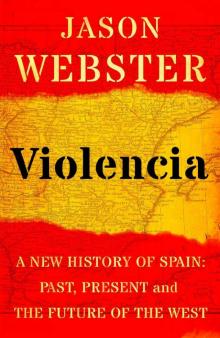 Violencia
Violencia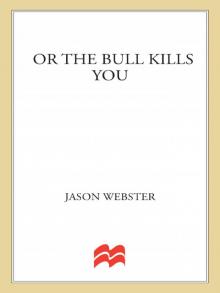 Or the Bull Kills You
Or the Bull Kills You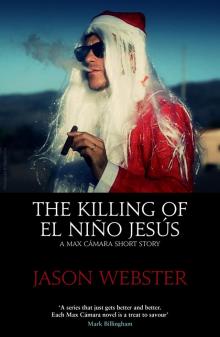 The Killing of El Niño Jesús
The Killing of El Niño Jesús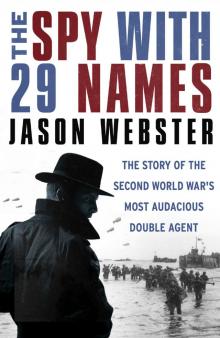 The Spy with 29 Names
The Spy with 29 Names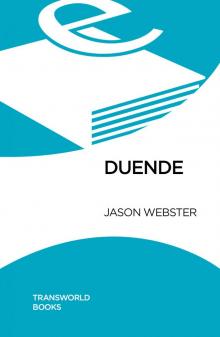 Duende
Duende Guerra
Guerra Sacred Sierra
Sacred Sierra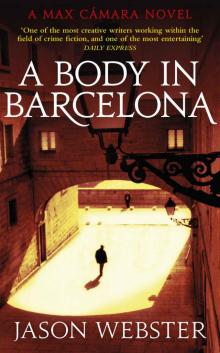 A Body in Barcelona: Max Cámara 5
A Body in Barcelona: Max Cámara 5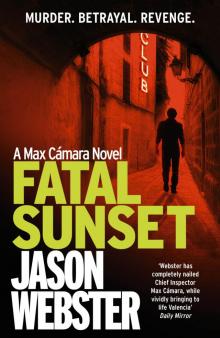 Fatal Sunset
Fatal Sunset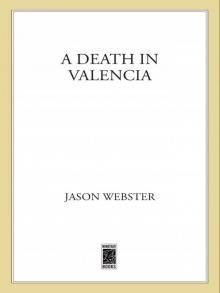 A Death in Valencia
A Death in Valencia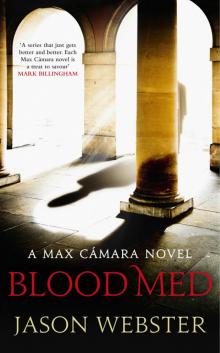 Blood Med
Blood Med Andalus
Andalus